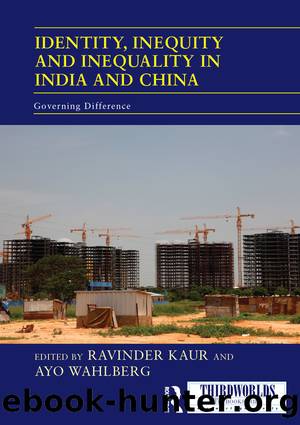Identity, Inequity and Inequality in India and China: Governing Difference by Ravinder Kaur & Ayo Wahlberg

Author:Ravinder Kaur & Ayo Wahlberg [Kaur, Ravinder & Wahlberg, Ayo]
Language: eng
Format: epub
ISBN: 9781138209336
Google: 4Mq3jwEACAAJ
Barnesnoble:
Goodreads: 31396998
Publisher: Routledge
Published: 2013-08-27T00:00:00+00:00
The election results showed that this propaganda paid high dividends in terms of votes. The BJP obtained more than two-thirds of the seats in the Legislative Assembly (and 49.85 per cent of the votes), testimony that an aggressive propaganda campaign, based on two forms of identity, religious and cultural, had reached wide sections of the electorate, both in rural and urban areas. While the campaign was still going on, many commentators denounced Modiâs decision to embark on the Gaurav Yatra as an attempt to reap electoral benefits from the carnage, and from this point of view the chief minister achieved his goal.39 However, from a different angle, the battle that Modi fought during the electoral campaign was not limited to the forthcoming electionâthe Gaurav Yatra was in fact aimed at consolidating a sense of âunityâ and âself-respect among fifty million Gujaratisâ.40 In this sense the propaganda discourse that accompanied the Yatra was in line with the whole rhetoric around the ethos and uniqueness of the Gujarati people that had informed BJP politics in the state from the previous decade. After their victory in the 2002 election, Modi and the BJP gradually abandoned anti-Muslim slogans in favour of propaganda that emphasised the achievements of the government in terms of economic growth and development. The launch, in September 2003, of the Vibrant Gujarat Global Investorsâ Summit sanctioned a new phase for the stateâs government. In this effort to clean up the party façade in the face of public opinion, Modi resorted even more frequently to the vocabulary of subnationalism instead of to blatant anti-Muslim slogans.
The reorganisation of the stateâs economy acted as a further element that strengthened a sense of unity and cohesion among Gujarati people. Under the blanket of Gujarati identity, such rhetoric proved successful in representing the aspirations of large sectors of the urban population to be part of a âmodernâ middle-class fold. Narendra Modi personified the success of these politics as he represented the most powerful stereotypes related to the Gujarati ethos: success as an economic reformer, religious devotionalism, capability to secure social peace.
Download
This site does not store any files on its server. We only index and link to content provided by other sites. Please contact the content providers to delete copyright contents if any and email us, we'll remove relevant links or contents immediately.
| Anthropology | Archaeology |
| Philosophy | Politics & Government |
| Social Sciences | Sociology |
| Women's Studies |
The Secret History by Donna Tartt(19052)
The Social Justice Warrior Handbook by Lisa De Pasquale(12187)
Thirteen Reasons Why by Jay Asher(8893)
This Is How You Lose Her by Junot Diaz(6877)
Weapons of Math Destruction by Cathy O'Neil(6264)
Zero to One by Peter Thiel(5786)
Beartown by Fredrik Backman(5737)
The Myth of the Strong Leader by Archie Brown(5499)
The Fire Next Time by James Baldwin(5431)
How Democracies Die by Steven Levitsky & Daniel Ziblatt(5215)
Promise Me, Dad by Joe Biden(5141)
Stone's Rules by Roger Stone(5081)
A Higher Loyalty: Truth, Lies, and Leadership by James Comey(4954)
100 Deadly Skills by Clint Emerson(4921)
Rise and Kill First by Ronen Bergman(4779)
Secrecy World by Jake Bernstein(4741)
The David Icke Guide to the Global Conspiracy (and how to end it) by David Icke(4703)
The Farm by Tom Rob Smith(4502)
The Doomsday Machine by Daniel Ellsberg(4484)
